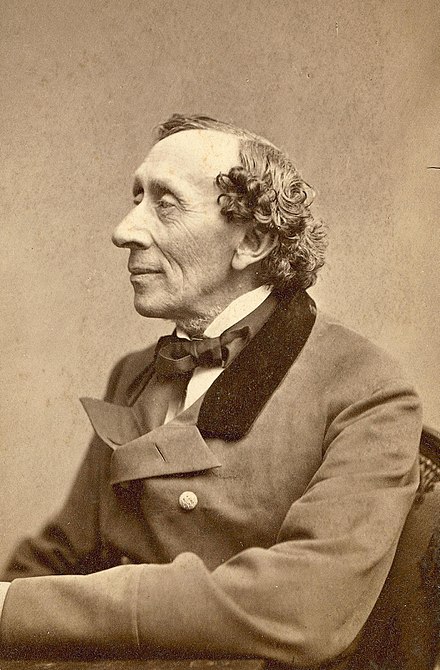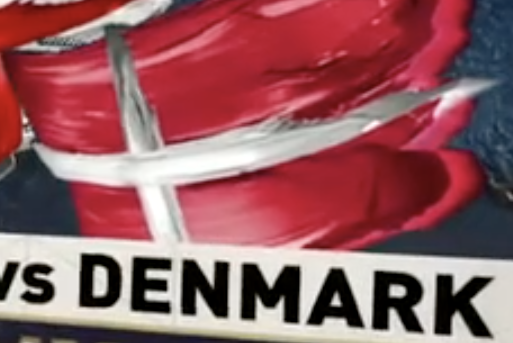For his final word on the ESPN broadcast of Denmark’s 2-1 win over the Czech Republic in the Euro 2020 quarterfinal match in Baku (!) on Saturday July 3, an announcer turned to literature to capture the moment.
He (either Derek Rae or Efan Ekoku) pulled out a quotation by Danish fairytale-teller Hans Christian Andersen (1805-1870) (at right) that a producer had dug out just for this moment:

“Life itself is the most wonderful fairy tale!”
The fact that Denmark was going to be one of the Last Four teams standing in the tournament seems plucked from the world of make-believe. (Aside: I love the way ESPN presents the flags of the nations in the tournament, above.) Three weeks earlier, during the team’s first game in the tournament, their best player (Christian Eriksen) had collapsed, apparently toppled by a heart attack. Somehow, the star-less team has been on a roll. Their story is true Once-Upon-a-Time stuff.
I wondered where HCA had written that quotation, which many people might know from a wall poster or a greeting card. Maybe “The Ugly Duckling”? “The LIttle Mermaid”? “The Emperor’s New Clothes”?
It so happens that the quotation (“Life itself is the most wonderful fairy tale.”) is the last line of his less-known, life-is-good story titled “What the Whole Family Said” (“Hvad hele Familien sagde”). HCA put the words in the mouth of the family’s Godfather, who lives comfortably in the attic of a house populated by numerous relatives.
Here’s the last paragraph of the story, from a version on the site of the H.C. Andersen Center of the University of Southern Denmark, translated by Jean Hersholt (who did not include the word “itself”). The “He” is the well-spoken Godfather.
“He knew all stories, all the fairy tales. And it was right from the bottom of his heart that he said, ‘Life is the most wonderful fairy tale of all!”
For any additional Denmark victories—the team played England on July 7–the announcer can use another HCA phrase and call the victory “The Most Incredible Thing” (“det utroligste”). That is an amazing tale first published in the U.S. in 1870. Author Abbott “Tom” Gleason referred to in Chapter 11 of his 2010 TidePool book, A Liberal Education.
For any additional Denmark victories—the team plays England on July 7, the announcer can use another HCA phrase and call the victory “The Most Incredible Thing” (“det utroligste”).
That is the title (sometimes with “Unbelievable”) of an incredible/unbelievable tale. It happens to be mentioned on pages 281/282 of the 2010 TidePool book by Abbott (Tom) Gleason, A Liberal Education.
In Chapter 11, Gleason described the tense student-takeover days at Harvard in the spring of 1969. This fairy tale came up during a crucial faculty meeting held on Friday April 11 (and summarized in a nearly-verbatim kind of way by Harvard’s president two days later in the Boston Globe).
Here’s the fairy tale–VERY BRIEFLY–and a professor’s retelling of it–VERY BRIEFLY:
A King of a certain Kingdom announced he would, in the words of economics professor Alexander Gerschenkron, “give the princess’ hand away in marriage to a man who would accomplish the most unbelievable thing. [emphasis added]”. Judges were just about to give the top prize to a handsome young man who built a wondrously intricate clock. Before they could bestow the top prize to that man, a “low-brow” guy walked in with a sledgehammer. As Gerschenkron put it: “He walked up to that block and with three blows he smashed up the clock.”
The judges had no choice. They gave the award to the destroyer. (Rest assured, Andersen worked things out for the handsome man and the princess.)
In Liberal Education, Gleason wrote, “The smashing of such a magnificent artifact was even more ‘unbelievable’ than its creation.”
Gerschenkron told the faculty that Harvard was that intricate clock, “a frail and fragile creation,” which must not be destroyed by the student protesters.
Gleason noted: “Gerschenkron let Harvard off the hook entirely for the troubles through which the university had been going.”
A Liberal Education by Abbott Gleason

